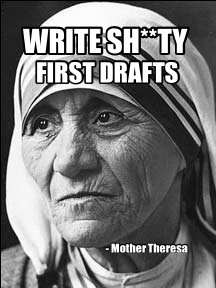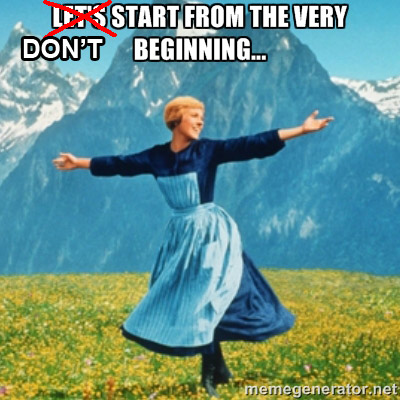Over the past few weeks, I’ve run into tons of people (it’s an epidemic!) who have great ideas for stories but just don’t know how to get started.
Thinking back on my first projects, I remember that “starter’s block” (That’s my new name for it! Trademark pending!) was hellish. Staring at a blank page is one of the most intimidating things in the world. The feeling of being overwhelmed coupled with the fear that “my story is going to suck” has brought many writers to their knees before they’ve even started.
I know, because I’ve experienced it myself.
However, with a couple novels, numerous short stories, and tons of blog posts sorta under my belt, I’ve gotten better at conquering starter’s block. I’m definitely not perfect, but I have picked up some tips that really help get me over that first hurdle:
1. Don’t be afraid to suck.
Someone told me Ernest Hemingway coined the phrase, “Write sh**ty first drafts”.
I’m not sure if it was actually him. (We all know how the Internet is about quotes. I’m sure I’ll find a meme of Mother Theresa saying “Write sh**ty first drafts!” somewhere.) But the saying is sooooo true in my book (look at me use those puns). When I sit down to write, I don’t look back. No editing, spell-checking, revising. Nothing. I just get it on paper as quickly as possible. The end result SUCKS but I have a story that actually exists! And I’m not second-guessing myself the entire way. Yay! After I’m finished, the wonderful thing called editing can begin that turns a book from a turd into a gem (or in my case, a turd into a slightly prettier turdlet nugget).
There’s actually something comforting knowing that every first draft won’t be great. It takes the pressure off of comparing early copies of your piece to another. And it can be a comfort to all you aspiring writers that your first draft isn’t going to suck any more than the rest of ours.
P.S. Look what I found:

P.S.S. OK I made it.
2. You don’t have to start at the beginning.
I have many moments where a random sentence (or even an entire paragraph) will come to me. Often times these little nuggets don’t fall at the beginning of a story.
So what do I do?
I sit down, write that sentence, and continue on from that point.
You don’t have to write your story chronologically. In fact, the ending of a work can sometimes shape or inspire the beginning. That’s a reason I write fast, crappy first drafts. Most of the time, I end up rewriting my intros based on what happens later. So why slave over writing that perfect beginning on the first try? Don’t be afraid to jump into a scene you’re more comfortable with and build off of that.

3. Relax your way into it.
Sometimes a simple, raw idea doesn’t feel like enough. One little nugget just doesn’t seem to provide the focus to get started. For example, I had an idea recently about a guy with actual gaydar. The idea of a real person having gaydar was interesting to me. However, that was all I had and it was impossible to sit down and start writing from that. I mean, where do you take such a broad idea? It can go anywhere.
In a nutshell, I needed to narrow the spectrum just a little bit. So how do I deal with that?
Instead of sitting at my computer – a place that screams “this is where you write!” – I go and do something relaxing. I take a nice long drive or go on a hike. They’re peaceful quiet jaunts I can embark on that don’t put a lot of pressure on me.
While I’m driving/hiking, I talk out the story to myself. And you know what? The creative juices usually get flowing. So many times, I reach that point where a few cool ideas start fleshing themselves out. Then, something even better happens: I get excited.
That’s my cue to start writing!
With the gaydar story, I remember driving down I-10 at night when a thought hit: What if he comes across one person (and only one) on whom his gaydar doesn’t work. Bam. There was a tangible idea I could work with and it started the dominoes toppling. And the resulting story is one I’m really proud of.
4. Don’t overthink it.
I’m going into a specific example with this item: research.
Lots of different novels – like historical fiction or political pieces – can require tons of research. This is especially true when you aren’t already somewhat familiar with the topic.
The really sucky thing is, the more you research, the more you realize you need to learn. It creates this awful, never-ending cycle. Even after countless hours of research, you still feel like you don’t know enough to begin. And so you don’t.
The result? Your novel ends up sitting inside your insecure head for years.
I really get this cycle because I was stuck in it forever. My first novel deals with ancient Palestine. Let me tell you, I knew soooo very little about that period. Consequently, I got caught in that research loop and never felt prepared enough to begin writing.
Then I stumbled across an article written by an author who produces historical fiction. In it, she said she’s often asked, “How do you know so much about all these time periods? You must have like 9 degrees!”
The author said she does just enough research to gain a familiarity with the topic… and then she begins writing. When she runs into places where she encounters factual holes, she essentially uses her common sense, makes stuff up, and keeps going. When it’s all said and done, she said it’s amazing how far common sense can take you. She seems to take a lot of liberties that often turn out to be true (or very close to the truth). And even if they aren’t, she knows, after writing the book, exactly where research is needed.
I think that’s an important point to make: holding off on research until after you have something on paper can be beneficial. It really narrows down exactly what you have to do and breaks that cycle of feeling the need to know everything. Case in point: about 2% of what I researched actually made it into the book.
(SIDE NOTE: You’d think I’d remember the article as it saved my life, but I have no idea where it is now. Oopsies!)
5. START START START START START.
Yep, actually sitting down and writing. That is the most important – and most difficult – part.
As I said, staring at a blank page is soooo scary. It hints at the work you have to do, at the nothing you have, at so many things.
But you have to get over that and just begin.
No making excuses.
A lot of people use the “My work would suck today because I’m tired/hungry/unmotivated/horny” reasoning to put off writing for one more day.
That’s a cop-out.
See, when you push yourself into a creative project, something wonderful happens. You get immersed in your world and your story. Once you dive in, all that “human condition” stuff has a tendency to fly out the window. Some of my best work came on days where I wasn’t motivated. I even had times where I was sick as a dog. But once I got buried in my writing, I completely forgot about my ailments and cranked out some good stuff.
And just remember that, to get started, your work doesn’t have to be perfect. Heck, it doesn’t even have to be good. It just has to be.